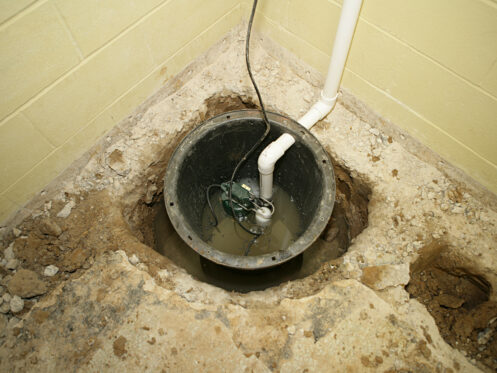When it comes to protecting the value and habitability of your Indianapolis, IN home, no contractor is more valuable than your plumber. After all, without a reliable way to eliminate waste and wastewater, your living environment would quickly become unsuitable for both humans and animals. From ensuring the delivery of fresh, potable water to keeping your toilets flushing, there’s a lot that these professionals can do to make your life easier. While you might know to call a plumber when your drains back up or your sink gets clogged, the following are 10 common things about plumbers that you’ve probably never heard before.
1. Calling a Plumber a Plumbum Isn’t an Insult
Despite its disparaging sound, calling a plumber a plumbum isn’t an insult. Instead, it hearkens back to the early beginnings of the plumbing industry when plumbers worked with lead. Plumbum is the Latin word for lead (PB).
For centuries, lead was used in municipal, commercial, and residential plumbing systems in pipes, flux, and solder. It wasn’t until 1986 that the Safe Drinking Water Act was amended, and all owners, builders, developers, and plumbers were legally required to use materials that were entirely lead-free. By then, plumbum or its modern derivative, plumber, had officially stuck.
2. Plumbers Aren’t Fans of Flushable Wipes and Most Garbage Disposals
Flushable wipes are marketed as being toilet-safe. However, you’d be hard put to find a plumber who actually recommends sending these products down your commodes. Unlike toilet paper which rapidly dissolves when submerged, some flushable wipes can take weeks or even months to break down. These slow-degrading products can get snagged on tree roots and weeds in aging sewer lines or get caught up on the rough interiors of pipes. If they don’t cause backups in these areas, they can also go on to merge with other grease-laden flushable wipes in municipal plumbing systems. When they do, they’ll create massive and difficult-to-remove obstructions known as fatbergs.
What you might find more surprising is that plumbers aren’t big fans of garbage disposals either. However, it isn’t the appliances themselves that give plumbers pause. Instead, it’s their name. The term “garbage disposal” implies that this is where consumers should be getting rid of their waste. Rather than cleaning out their refrigerators and tossing massive amounts of old spaghetti, cooked rice, and more in the trash, some people are feeding these aging collections right into their plumbing systems. Using a garbage disposal as an alternative to a waste bin can also mean exposing it to things that it’s not really designed to grind up. These include:
- Coffee grinds
- Citrus peels
- Eggshells
- Potato peels
- Nuts
When you have a licensed plumber install, maintain, or repair your garbage disposal, ask for a list of things that you should avoid putting in this appliance. More likely than not, you’ll get a long one.
3. Plumbers Can Have Specialties
Much like doctors and dentists, plumbers often have specialties. If you have a clogged toilet or sink, a general plumber can handle the job. However, if you have a blocked or broken sewer line, you might want to hire a plumbing company that specializes in trenchless pipe repair or other dig-free solutions. Plumbers with specialties can offer services that some general plumbers cannot, including:
- Hydro-jetting and hydro-steaming
- Cure-in-place pipe replacement
- Camera line inspections
- New fixture installations
In addition to residential and commercial plumbers, there are new construction plumbing companies, sanitation plumbing companies, and plumbers that focus on water supply issues only. There are also plumbing companies that do it all.
4. Plumbers Find Their Roots in Ancient Rome, Egypt, and Greece
The organized removal of wastewater and the supply of fresh, potable water aren’t as new as most people think. With plumbers getting their Latin-inspired moniker from Rome, you can find the origins of plumbing in Ancient Rome, Egypt, and Greece.
Greece is recognized as having had the first sewage and drainage system in 1700 BC. But the first ever recorded use of plumbing is in Ancient Egypt where pipes transported fresh water. In Rome, the development of aqueducts brought fresh drinking and bathing water to citizens from as far as 60 miles away. These subterranean and above-ground channels were comprised of volcanic cement, stone, and brick. As expected, nearly all ancient water distribution systems also contained elements of lead.
5. You’ll Need to Call a Plumber About Your Water Heater
If you’re new to home ownership and have only lived in apartments before, you might be surprised to discover that the professional to call for water heater installation, maintenance, and repairs is a plumber. It’s easy to lump these appliances in with HVAC systems given that they often share a fuel source with furnaces. However, water heaters are part of residential plumbing. They’re responsible for heating the water that services every tap.
6. Plumbers Play an Important Role in Your Fight Against Pests
Another surprising fact about plumbers is that they play a critical role in pest management and control. Among the very best ways to avoid problems with rats, mice, cockroaches, and ants is making sure that these critters don’t have easy access to your water supply. When you have slow and hidden leaks throughout your home, certain insects and animals can smell them. In fact, with hidden leaks, they’re actually more likely to find pooling water than you. If you’re having a hard time getting rid of an active infestation, fixing plumbing problems could be an essential part of your treatment plan. This is also true when it comes to fighting off stubborn problems with mold, mildew, and excess indoor humidity.
7. Historically, Plumbers Were Masters of Nearly All Trades
Hats off to the plumbers of the ancient world. They weren’t just masters of working with lead. Given their access to complex, multi-functional, and high-quality tools, and their knowledge of complicated systems, they often performed double duty by working in multiple industries. Throughout the ages, plumbers have leveraged their talents to build coffins, design custom gutters, and cast statues and ornaments among many other things.
8. You Can Hire a Plumber to Combat Nasty Indoor Odors
You may be wondering who to call about foul and pervasive odors. If your home has a thick, meaty, or sulphorous odor, it could be coming from your drains. Unpleasant drain odors can often be attributed to built-up grease, soap scum, hair, and other organic materials. If a light drain cleaning is all you need, you probably won’t smell these odors further than five feet away from the drains that are causing them. However, if bad smells have permeated every corner of your living space, you may have an impending whole-house backup, problems with P-traps in your pipes, loose seals, or build-ups of bacteria and biofilm that require professional pipe cleaning.
We’re proud to consistently rank among the most trusted plumbums in Indianapolis, IN. We love what we do and we love the history of our industry. We offer drain cleaning, leak detection, and plumbing repair services. We also provide water heaters, water softeners, and sump pumps. To schedule an appointment, contact Hope Plumbing now.

